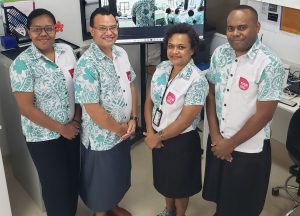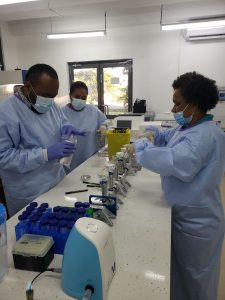

The RISE lab team during the virtual audit. Left-Right Vinaina Waqa (Lab Assistant), Autiko Tela (Assessment Team Leader and Chief Investigator), Silivia Vilsoni (Scientist) and Revoni Vamosi (Scientist).
The Fiji National University (FNU) is proud to be a collaborative partner of the Revitalising Informal Settlements and their Environments (RISE) project, which recently received ISO9001 Certification.
RISE is a research-based consortium of institutions, led by Monash University, working to introduce low-tech sanitation technology into informal settlements in Fiji. FNU is a project partner through research and data collection and analysis.
The program aims to collect the first-ever rigorous scientific evidence that a localised, water-sensitive approach to upgrading informal settlements can deliver sustainable, cost-effective improvements to health and the environment.

The lab team analysing the samples for DNA Extraction and Sequencing.
The project will see improved access to essential water and sanitation for 12 rural communities in Fiji. All ecological, environmental, and human health samples that are collected from the 12 informal settlements participating in RISE in Suva are sent to and stored at the RISE laboratory at FNU.
RISE Assessment Team Leader and Chief Investigator, Autiko Tela said the RISE program had developed strong standard procedures, laboratory and fieldwork protocols over the past three years.
“The ISO certification process is a formal recognition and documentation of all those processes. Certification demonstrates that RISE is functioning under a best practice quality assurance,” Tela said.
“The ISO certification provides the framework and structure to show the strong processes that RISE already had in place. An in-depth audit process required teams across countries and across research disciplines to pull together documentation from across the program to showcase these high-standards.”
“Going forward, we will maintain those best practice protocols.”
Tela added that an added milestone for the program would be the water and sanitation infrastructure intervention being built in the first six communities in Suva next year.
“After this, the research (regular collection and analysis of ecological, environmental and human health samples from our 12 communities) will move to the all-important post-construction phase,” he said.
“Our intensive research program will continue until the end of 2024.”